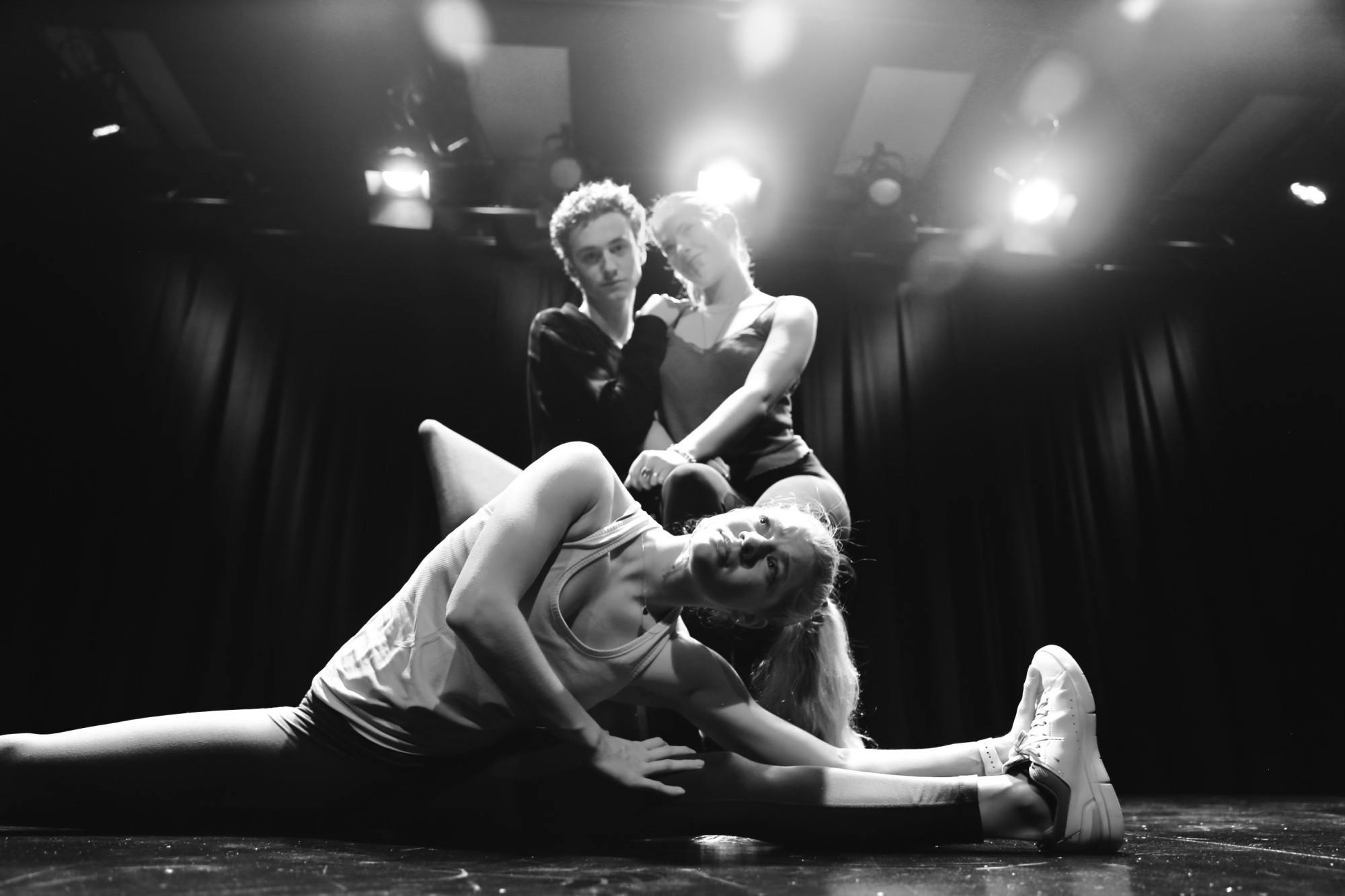On Friday, Oct. 13 at 7 p.m., the Displaced Theatre Company performed a staged reading of Clare Barron’s “Dance Nation,” a play that follows a pre-teen competitive dance troupe on their way to nationals. It is a drama meshed with a coming-of-age comedy that also highlights mental health, sexuality and women’s empowerment.
“Dance Nation” begins in complete darkness and utter silence. It is intimate — viewers surround all three sides of the stage in a small room. Next, the stage lights up to reveal eight nervous, excited dancers in front of a dance teacher named Pat, played by Carlo Guerrini-Maraldi ’26. Between hushed laughter amongst the dancers, to sprinting for hair ties and shrieks of preteen excitement, the audience immediately forms a connection to each of the characters.
Actor Alice Lloyd ’27 was initially drawn to Displaced Theatre specifically because of its emphasis on contemporary themes such as those seen in “Dance Nation.”
“[A friend] explained to me that Displaced Theatre did more daring pieces and tried to perform in unusual places,” Lloyd said. “I’d never been exposed to this kind of theater at school … Everyone seemed really cool, fun and courageous, and I loved that energy.”
A showcase of student talent, identity and dedication, “Dance Nation” tackles coming-of-age challenges in a digestible, thought-provoking manner. Amid changing venues only a few days prior to the performance and watching Barron’s play together only a day before, Displaced Theatre Company’s “Dance Nation” tackled these challenges together, growing even closer as a cast and crew.
Unlike a typical play, a staged reading — such as that of Displaced Theatre’s “Dance Nation” — involves minimal costumes, props and set design, according to co-directors Kamila Boga ’25 and Kate Clark ’25. In addition, actors can read off of their scripts.
During the show, many actors were able to go off-book and totally embody their characters, according to Boga. As a result of intensive rehearsal, they were able to bring all of the emotion that comes with a full production of a play, and with the new venue, the show was more intimate and close with the audience.
“The intimacy with the audience was so fun for me,” Lloyd said. “I was able to, at certain points but especially in my monologue, hone in on people’s eye contact… That’s what I love, being able to involve people.”
The actors were able to bring this depth in part because of the collaborative nature of carving characters, according to Boga. Despite being “off” this term, Boga frequently met with actors individually via Zoom in addition to coming to campus for “tech week.” Meanwhile, Clark was able to be in-person with the cast and physically meet for rehearsals. In all, every single cast member was able to meet one-on-one with the directors at least twice.
“With such a large cast, it was really important for us to make sure that everyone felt like they were getting the time, care, and attention they needed to develop their character and their performance,” Boga explained.
One way in which the directors collaborated with the actors to develop their characters is through the “amp up” songs that each actor chose for their character. Rather than the directors telling each actor about the essence of their roles, Boga and Clark allowed the actors to decide for themselves. Having the opportunity to take ownership of her character in this way allowed Lloyd to feel more connected to a role.
“Never have I been able to step into my character in that way, like choosing a song that gets me in the zone for my character,” Lloyd said. “It made me understand my role better, and these techniques were really fun and creative.”
As a director, Boga was focused on how she and Clark could help fulfill each actor’s needs.
“If [the actors] wanted more rehearsals, or if they wanted specifically to work on their movement or a monologue, we were always open to that,” Boga said. “What I like to do is always ask, ‘How did that feel for you? What do you want to do next?’”
The company’s motto of collaboration and the importance of supporting one another was also vital to the success of Boga and Clark’s partnership as co-directors and their work with everyone behind the scenes.
“By no means what I’ve been able to do [the show] or figure it out without everyone on the [production] team,” Clark explained. “We were in constant communication. There were a lot of check in meetings. I was probably on the phone with [Boga] every day for over an hour.”
For Clark, Displaced Theatre Company and co-directing “Dance Nation” has become one of the highlights of her Dartmouth experience. Despite having limited acting experience, she expresses gratitude for the creative trust and liberties that are facilitated within the company.
“Displaced is special in that it’s an environment where everyone is really creative, has ambition, has a vision and really wants to push each other,” Clark said. “It was really cool being put in a position where I was trusted creatively and where I have a lot of room to take initiative.”




